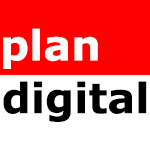“Everything is moving online into ‘The Cloud’ but we still need to work out how to monetise products and services that can’t be replicated digitally.”
Read below for my summary (and personal comments) of the fantastic presentation delivered by Gerd Leonhard (www.mediafuturist.com) on Day 1 of the Thinking Digital Conference @ Sage Gateshead on 25th May 2011.
‘The People of the Cloud’ / ‘People of the Screen’ expect things to be digital first, physical next.
You can no longer ‘force’ people to buy - you now need to ‘attract’ people to buy/upgrade from the free version once they’ve used and grown to love/need it (a classic Freemium model like LinkedIn).
“When copies are free, you need to sell things that can’t be copied”, Kewing Kelly (Better Than Free).
If people expect digital copies to be free (or very low cost), it’s down to you the ‘content creator’ to work out how to sell things that can’t be replicated or copied digitally. For example, although video footage can be streamed live or broadcast after an event, you can’t digitally recreate the actual physical experience (sights, sounds, smell and touch) of being at a live music gig, conference or training session and all the feelings of excitement and interactions before, during and after which take place.
‘360o Deals’ in the Music Industry
As physical record sales continue to fall, they are increasingly seen as merely a ‘calling card’ or marketing tool for artists and bands. At the same time, live music gigs and festivals are on the up. Therefore, record labels now seek to sign new artists and bands up to ‘360o Deals’ which means that they make money on live performance fees, merchandise, advertising endorsements, mobile ringtones, tv and movie deals , not just physical and digital download record sales. People can now even pay for a recording of a live gig immediately after a gig has ended.
Authors like Seth Godin understand this. They realise that some people want exclusive, advance copies of the latest titles sent directly to their Kindle or other eReader device (either for free in return for writing reviews, helping to spread the word and creating a buzz, or for a fee which ensures they get it quicker than all ‘normal people’ (see my earlier post about ‘The Domino Project’ and ‘Rise of the Information Jockey (IJ)‘.
Meanwhile, others will still prefer the look and feel of a physical book (hardcover or paperback which both have a different cost and speed at which they can be obtained/delivered. Further still, ‘superfans’ will happily pay much higher prices for limited editions which offer something unique and special. It’s all about offering choice and giving the user/consumer what they want.
Can you divide your products or services into digital, hardcover, paperback or limited edition-type versions?
Locking stuff behind a paywall or asking them to pay upfront is a deathwish online. It doesn’t work or make any money (or as much as you want). Sharing is the default mindset of the digital generation and if you don’t share you will be toast! Spotify rocks but their latest move (limiting the number of times people can listen to music for free) could signal the end.
“Data is the New Oil”
“Data is the new Oil” says Gerd - a more succinct version of the original quote by Meglena Kuneva (EU Consumer Affairs Commissioner) in Brussels on 31st March 2009 in which she said “Personal data is the new oil of the Internet and the new currency of the digital world”
Both are great quotes which perfectly sum up the way things are heading (or have already headed) in the digital world. However, just like oil, the true value (and money) only comes from the myriad of products and services that can be derived from the raw material!
Social networks are broadcasters spreading news and information faster than traditional media channels. For example, “It takes roughly 41 seconds for ‘old media’ (i.e. tv) to report a breaking news story but just 28 seconds on Twitter!” New media then has the added bonus of being instantly ‘shareable’ - passing along far wider and more random patterns around the world.
We are moving away from providing digital copies which people can download and keep (MP3s, PDFs) to content they can stream so long as they continue to use the service (like the aforementioned Spotify).
The Future?
The future is all about;
• Bundling (content provided pre-loaded onto hardware devices like mobile phones)
• Freemium
• Up-selling
• Streaming
3 ways for creatives (or creators) to get paid;
• I pay (as a creator, you can get others to write a blog entry about you in return for payment)
• They pay (consumers are forced to watch adverts before accessing the content, i.e. at the beginning of a music video or computer game)
• You pay (consumers pay a subscription to access premium content & unlock additional features - classic Freemium model)
Find Out More / Discuss Further
If you’d like to read more from Gerd Leonhard (@gleonhard), visit www.mediafuturist.com where you can download free ebooks (the hope being that you will appreciate his work so much that you will go on to pay for a physical copy).
Like this:
Like Loading...
